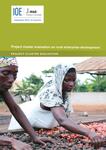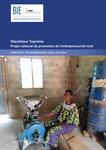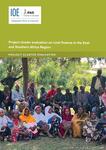Page Header
Root and Tuber Improvement and Marketing Programme
Overview
Implemented between 2005 and 2015, the Root and Tuber Improvement and Marketing Programme in the Republic of Ghana aimed to build up competitive, market-based and inclusive commodity chains for roots and tubers to enhance food security and incomes of poor rural households in the country, with a special emphasis on women and other vulnerable groups. The programme design was relevant to the country context and government priorities. The elements of an inclusive value chain development approach were in place, and the design and initial arrangements displayed a relatively solid intervention logic. Nevertheless, the implementation focus was largely biased towards production with insufficient attention to the processing and marketing aspects, leading to unfulfilled potential and oversupply of produce and local market saturation. Overall, the main achievement of the programme was a change of farming practices. As a result, there were increases in crop productivity and food security which contributed modestly to household incomes. The objectives related to the value chain development, and processing and marketing skills upgrading, were, however, underachieved. The evaluation underlines the need to invest early in specialized skills on market development and to pay closer attention to demand fluctuations for future market-oriented projects. Exploring alternative rural financing mechanisms and a variety of marketing approaches such as contract farming was also recommended.Report Details
| Year Published | |
| Type | |
| Joint | No |
| Partner/s | N/A |
| Consultant name | Dorothy Lucks |
| Agency Focal Point | Shijie Yang |
| Focal Point Email | s.yang@ifad.org |
| Managed by Independent Evaluation Office | Yes |
| Country/ies |
YOU 'RE READING
Root and Tuber Improvement and Marketing Programme











